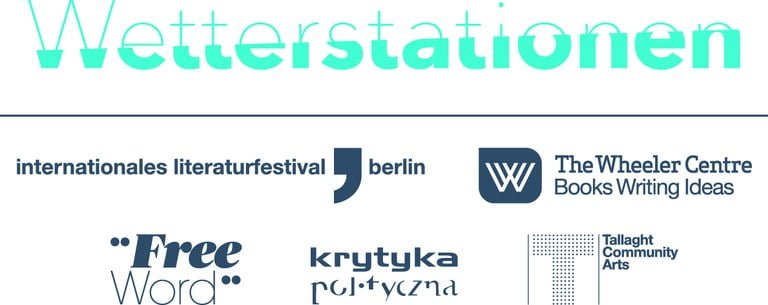
Weather Stations is an international project that placed literature and storytelling at the heart of discussions about climate change.
Five partners in Berlin, Dublin, London, Melbourne and Warsaw each worked with a Writer in Residence to explore together how literature can inspire new ways of living in the context of the most fundamental challenge facing humanity today – our changing climate. They also each established a Substation at Romain-Rolland-Gymnasium and Sophie-Scholl-school, where they worked with teachers and pupils to discover how we might nurture responsible young citizens with the knowledge, motivation and tools to fight for a more sustainable future.
Through the blog www.globalweatherstations.com they shared their work: the discoveries, delights and frustrations they encounter over the course of the project, as each writer visited each Weather Station to experience each partner’s unique perspective on climate change.
Literature gives humanity to concept. Writers create worlds for us to explore, and in reading them, we are able to empathise with others and to imagine how we might work together towards ecological sustainability and social justice. We need storytellers to interpret the science, to by-pass the politics and to ignore the too often narrow self- interests of finance. And in doing so, show us how our lives could be lived differently, guided by ecological rather than economic imperatives.
At the end of the project, we had made a body of literature with a new language and a narrative to express how we might move from a doomed economy of industrial growth to a life-sustaining society committed to the recovery of our world.
The texts of the participating authors and more information on the project can be found at www.globalweatherstations.com.
The Authors
Our five writers in residence are an inspiring group of writers whom we have chosen for their talent, style and dedication to a sustainable future.
Mirko Bonné: Writer-in-residence of the international literature festival berlin

Mirko Bonné, born 1965 in Tegernsee, lives in Hamburg. Besides translations of, among others, Sherwood Anderson, Robert Creeley, E.E. Cummings, Emily Dickinson, John Keats, Grace Paley and William Butler Yeats, he has published five novels, five volumes of poetry, and a book of travel journals and essays. For his work Bonné received many awards, including the french Prix Relay du Roman d’Evasion, the Marie Luise Kaschnitz Prize and the Rainer Malkowski Prize. As a writer-in-residence Mirko Bonné visited Marseille, Rio de Janeiro and Shanghai. His novel ”Nie mehr Nacht“ was a finalist for the German Book Prize in 2013.
Xiaolu Guo: Writer-in-residence of Free Word in London

One of Granta’s Best of British writers under 40, Xiaolu Guo is profound, incisive, funny and often disturbingly accurate. Guo is author of A Concise Chinese-English Dictionary for Lovers,nominated for the Orange Prize for Fiction, and Writer and Director of UFO in Her Eyes, “City of Venice” prize at the Venice Film Festival.
JJaś Kapela: Writer-in-residence of Krytyka Polityczna in Warsaw

Jaś Kapela is a poet, novelist and columnist, as well as a member of the Krytyka Polityczna team. He is a proud left-winger who, in his darkly comic work, focuses on the conflict of a traumatised individual with a hostile society which heads straight to hell. His work often takes a form of a social performance. In 2013 Kapela participated in Live Green, a campaign for ecological lifestyles led by the Green Cross, Poland.Kapela is the author of Stosunek seksualny nie istnieje (Sexual intercourse Does Not Exist) and Janusz Hrystus (Janus Hrist). His third novel Dobry Troll (The Good Troll) will be published in May 2015.
Oisín McGann: Writer-in-residence of Tallaght Community Arts in Dublin

Oisín McGann is one of Ireland’s leading writers and illustrators of books for children and young adults. McGann’s work weaves fantasy worlds with real issues allowing young readers to consider often quite serious social and personal consequences. McGann’s writing and illustrations are a stimulating catalyst for young writers to explore the metaphorical landscape of how to write imaginatively and provokingly about climate change in a way that will actively engage young readers. McGann is author of nine young adult novels, his latest Rat Runners was released in 2013.
Tony Birch: Writer-in-residence of the Wheeler Centre in Melbourne

Tony Birch was born in inner-city Melbourne to a large family of Aboriginal, West India and Irish descent. His challenging upbringing inspires much of his work. Two of Birch’s novels Shadowboxing and Father’s Day are taught in the Australian Victorian Secondary School system. Birch is also the author of Blood, shortlisted for the 2012 Miles Franklin Award.
WEATHER STATIONS AT THE 15TH ILB
» I just now realized that there is so much more to it than just climate change. Because it is not the climate that has to be change. It is us. « (Kim, Youth Summit)
11.09.2015: Stop the Silence: Youth Summit
»Weather Stations« is an international project with the involvement of the ilb, which aims to place literature and narration at the centre of the climate change debate. Since February 2014, five international authors from Berlin, Dublin, London, Melbourne, and Warsaw have been visiting schools to explore how literature can inspire new mentalities and lifestyles in the face of climate change. During the ilb 2015 a three day youth conference took place, at which 20 students from five international project schools worked together and presented, at the public finale, their own texts, images, and videos on the theme of climate change.
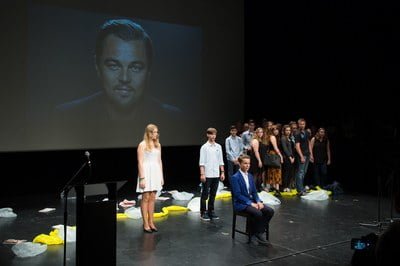
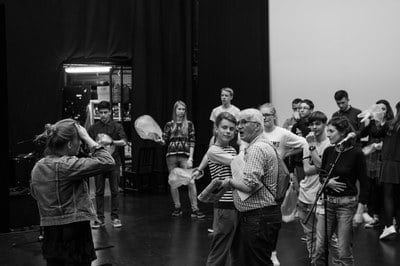
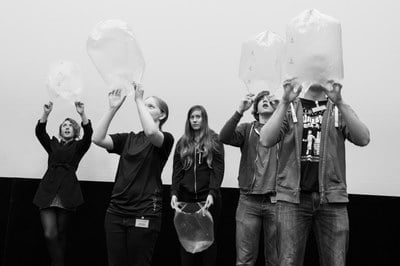
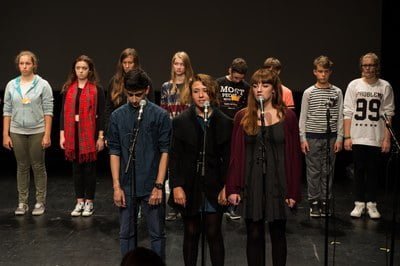
© photos: Ali Ghandtschi
111.09.2015: »Writing Climate change.« Publication of the Anthology: Tony Birch [Australia], Mirko Bonné [GER], Xiaolu Guo [China/ GB], Jaś Kapela [PL], Oisín McGann[Ireland]. Weather stations puts Literature and Language in the Centre of the Debate on Climate Change
»Deep down do I really care?« – What contributions can literature and language make when it comes to one of the greatest crises to ever confront mankind? The international project »Weather Stations«, which aimed to bring literature and language into the center of the debate on climate change, posed exactly this question. For 18 months, five authors from five countries have worked intensively with the theme. They read texts from the anthology »writing climate change« and discussed with the project’s founders the question: does literature give us another way of approaching the reality of climate change? The students participating in the project organized the finale of the event, in which they manifoldly formulated a self-determined goal: Stop the Silence. You can download and read the Weather Stations anthology „writing climate change“ here.
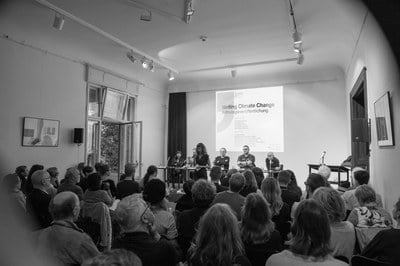
12.09.2015: »Klimasprachen« – Reading and Discussion with Mirko Bonné, Torsten Schäfer und Ranty Islam
In the context of »Weather Stations«, in which authors wrote about the climate change, novelist Mirko Bonné, journalism researcher Prof. Dr. Torsten Schäfer, and journalist Ranty Islam discussed new ways of communication for the topic. What kind of climate language is there? What could journalism learn from literature? What chances does the multimedia language world offer?
Mirko Bonné presented his narrative poem »Plastikmeer«. A previous work – a series about the language of the climate change – can be seen on gruener-journalismus.de.
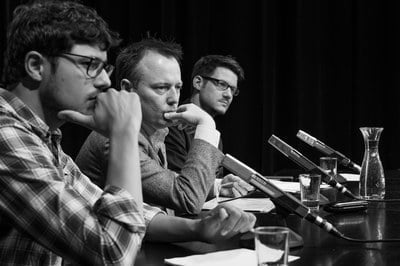
WEATHER STATIONS AT THE 14TH ILB
Exploring climate change: Prof. Hans Joachim Schellnhuber [GER] in conversation with Xiaolu Guo [China/ GB], Mirko Bonné [GER] and Tony Birch [Australia]
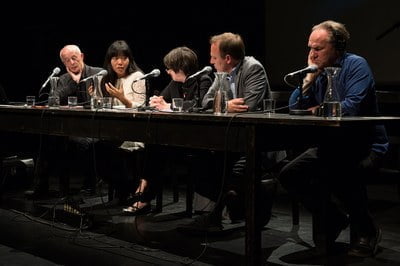
Exploring climate change: Mirko Bonné [GER], Tony Birch [Australia]
Weather Stations is an international project that placed literature and storytelling at the heart of discussions about climate change. Five partners in Berlin, Dublin, London, Melbourne and Warsaw each worked with a Writer in Residence. Those explored together how literature can inspire new ways of living in the context of the most fundamental challenge facing humanity today – our changing climate. The ilb nominated the author Mirko Bonné. In an first Weather Station event he and the australian writer in residence, Tony Birch, read extracts of their work about the experience with weather and climat. They asked: Where do we meet climat change? How can authors react to climat change? Is there a literaly language that can represent climat change? – All these questions were also discussed by the audience.
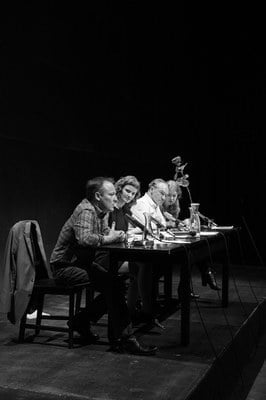
Kindly supported by the cultural programm of the European Union

Gand by Jan Michalski foundation

